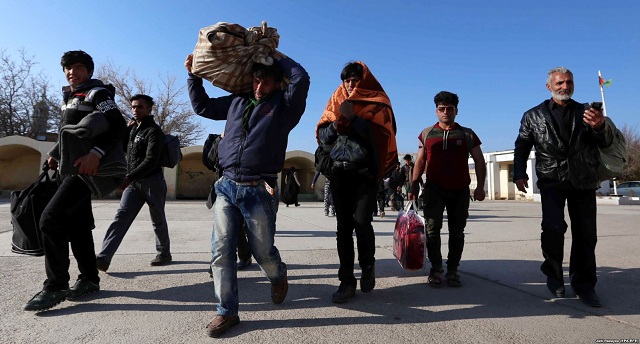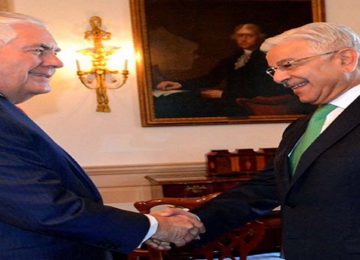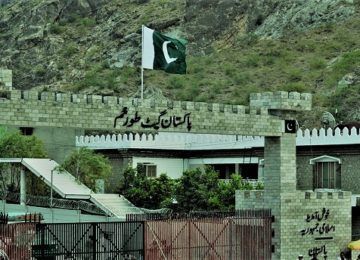As the United States reinstates crippling economic sanctions on Iran, Washington’s ally in the region, Afghanistan, could become collateral damage.
A first wave of U.S. sanctions against Iran that had been eased under a 2015 nuclear deal went back into effect on August 7, targeting the country’s economy.
But Washington’s censures of Tehran will also hurt Afghanistan, which has forged increasingly strong economic links with its western neighbor.
As Iran’s financial woes worsen, an exodus of Afghan migrant workers is expected and an economy in Afghanistan that relies on remittances flowing in from Iran will suffer.
The new U.S. sanctions could also lead to landlocked Afghanistan losing access to Iran’s sea routes and a budding trade could be scaled back.
Analysts also warn that Iran could retaliate to U.S. sanctions by ramping up its covert support for the Afghan Taliban, the militant group that has fought against U.S. forces since 2001.
“Afghanistan is at risk of becoming an unintended casualty of heightening tensions between Washington and Tehran,” says Ahmad Majidyar, the director of the IranObserved Project at the Washington-based Middle East Institute.
In May, U.S. President Donald Trump withdrew from the Iran nuclear deal that eased international sanctions on Tehran in exchange for curbs on its nuclear program. A second wave of U.S. sanctions targeting Iran’s oil sector and financial system will be reinstated in November.
‘Significant Decline’ In Economy
A record 440,000 Afghans migrants left Iran this year, with nearly half of them returning to their homeland voluntarily, according to the International Organization for Migration (IOM).
The IOM says the mass exodus has been largely driven by Iran’s crippling economic crisis, which has sent unemployment soaring and the national currency plummeting, hitting migrant workers particularly hard.
The demand for work in the informal economy, where most Afghans are active, has declined sharply. Iran’s currency, the rial, has weakened against the afghani and is at record lows against the U.S. dollar, which is widely used in Afghanistan.
“As all Afghans [living in Iran] typically send home the main parts of their earnings in the form of monthly remittances, the Afghan economy itself will suffer direct and immediate effects,” says Nick Bishop, emergency-response officer for IOM Afghanistan.
Afghanistan suffers from around 40 percent unemployment, is heavily dependent on dwindling foreign aid, and is in the midst of the worst drought in decades. Humanitarian groups say the returnees from Iran, should they stay, could exacerbate the problems Afghanistan is facing.
“[There will be] less money coming from working males who are instead returning home to [Afghanistan] to few jobs, combined with an ongoing drought and resource competition with other returnees will mean a significant decline in the economy, worsening impacts of the drought linked to migration, and potentially the conflict itself,” Bishop adds.
‘Undercut Regional Connectivity’
Pakistan has historically been Afghanistan’s biggest trading partner but Iran has now taken its place. Afghanistan’s Chamber of Commerce and Industries said in March that trade between the two countries in the past year amounted to nearly $2 billion, an almost 30 percent increase from the previous year. In comparison, trade with Pakistan amounted to $1.2 billion.
Afghanistan’s economic future is also linked with Tehran via Iran’s Chabahar port complex, a project that is part of a new transportation corridor for Afghanistan that could potentially open the way for millions of dollars in trade and cut its dependence on rival Pakistan, its neighbor to the east.
The project is a key part of developing the Afghan economy, a major goal of the U.S. strategy to end the United States’ longest war.
But the project could be derailed by U.S. sanctions. “The return of U.S. sanctions on Iran undercut Afghanistan’s regional-connectivity ambitions, as the sanctions make it harder for India to develop Iran’s Chabahar port,” analyst Majidyar says.
Afghanistan has applied for a sanctions waiver for Chabahar, but Washington has yet to make a final decision.
Washington has indicated that it would not sabotage the Chabahar port project. The Pentagon and the U.S. State Department have encouraged India to use Chabahar to increase its investments in Afghanistan.
“But as U.S. sanctions on Iran are reinstated, many Indian and international companies would be reluctant to be involved in the project, fearing U.S. secondary sanctions,” Majidyar adds.
Those secondary sanctions include existing U.S. sanctions linked to Iran’s human rights record, alleged support for terrorism, and its ballistic-missile program that forbid U.S. and foreign companies from doing most forms of business with Tehran. Secondary sanctions could leave big banks and multinational companies worried they could still be prosecuted for doing business in Iran.
‘Covert Support For Taliban’
Analysts also warn that U.S. sanctions on Iran could have security ramifications for Afghanistan. “The big risk for Afghanistan of U.S. sanctions on Iran is that Tehran could retaliate by ramping up its covert support for the Taliban,” says Michael Kugelman, South Asia associate at the Woodrow Wilson International Center for Scholars in Washington.
Iran has been long been accused of providing support to the Taliban, an allegation it denies. Tehran has confirmed it has contacts with the Taliban but insists that it is aimed at ensuring the safety of its citizens in Afghanistan and encouraging the Taliban to join peace talks.
“Iran has already provided small arms and other support to the insurgents, and the sanctions regime could give it a powerful incentive to increase that support in an effort to strengthen Washington’s enemy,” Kugelman adds.
Rising support from a powerful regional actor would be a blow to Kabul and Washington, who are trying to convince the Taliban to agree to a negotiated end to the 17-year-long war.
This article originally appeared on RadioFreeEuropeRadioLiberty’s Website on August 14, 2018. Original link.
Disclaimer: Views expressed on this blog are not necessarily endorsed or supported by the Center for Research and Security Studies, Islamabad.








